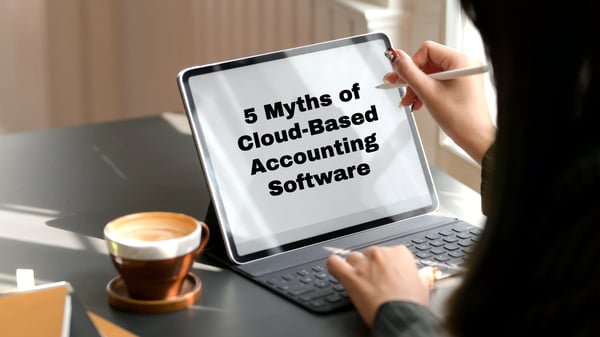5 Myths of Cloud-Based Accounting Software: Debunked
The cloud allows you to access to your data in real-time and from anywhere with an internet connection but there’s still some misinformation floating around. It sounds like an ideal solution to any accounting team: realtime reporting, automatic updates, and flexibility to work remotely. So what are some of the myths that accountants still believe about cloud-based accounting software? Read on as we debunk five of the most common ones.

Myth 1: Cloud Software is Expensive
Most of the cloud-based accounting software is subscription-based and has users pay monthly or annually to keep using it. Since it’s a recurring cost, many people feel that it adds up and becomes more expensive than traditional, desktop accounting software. However, cloud-based accounting software can cost as little as $5 per month and can offer quite a bit more than your traditional desktop software.
First, consider the value of the accounting software. With desktop accounting software, you’ll purchase a certain version that likely won’t update for years. Then, when the new version comes out and the version you have becomes obsolete, you’ll need to purchase the new version and migrate all of your data. Instead, cloud-based accounting software is constantly updating during the subscription, so you always have the best and most up-to-date version.
Cloud-based accounting software also allows users to access information from anywhere with an internet connection, rather than being tied to the office. This increases productivity and helps make sure the accounting is done each month, regardless of where the staff is located. It will no longer matter if your accountant is on holidays in New York, at grandpa's in Czechia or sitting in your office, he will always have up to date data for his work at the hand's reach. Leveraging a cloud-based accounting software can greatly reduce office expenses since the team is no longer required to be on-site to perform their duties. Fewer expenses lead to an increase in profits in the long run.
According to Statista, average rent price per sq foot in the US was in 2019 nearly $6. How large is the office of your accountant who could stay homeor work fully remotely?
It’s true that desktop software can be cheaper than cloud-based accounting software if you consider the one-time, upfront cost and spread it across the life of your company. However, it’s likely you’ll need to upgrade the software every few years, where you’ll be required to buy it all over again. When you break that cost out as an annual or monthly expense, it becomes pricey.
Myth 2: Cloud Software is Unpredictable
Cloud-based accounting software actually gives you and your team more certainty. Since the cloud technology allows you to access data from anywhere with a connection, it makes it easier to get the work done and makes sure everything in your business is accounted for, regardless of weather, illness, or anything else that may come up.
You won't have to worry anymore about the hardware, your computer, on which you run your accounting. With cloud-based accounting, you don't worry about costs of computer maintenance, about data safety in the case your server breaks down, and you don't worry that you are planning to switch your systems to Linux, that your accounting software won't work on the operating system anymore.
The added stability of cloud-based accounting software is keeping pace with the world as workers become more remote-based and less dependent on traditional office space. Now, you can look for the best accountants when you’re hiring and their location doesn’t matter. No more relocation expenses.
Myth 3: My Data Isn’t Secure on the Cloud
Just because a software is housed on a desktop or local network doesn’t mean it’s safe. The data can still be hacked by cybercriminals or it could be lost if the software or hardware fails. It’s important that you backup your data securely - no matter if it’s on the cloud or a local device.
However, cloud-based software has added layers of protection to help keep cyberattacks at bay. Software companies use the latest security measures to help protect your data while using their software. Since the software company specializes in cloud-based solutions, they use some of the best-rated security measures around. Plus, cloud-based software makes sure you won’t lose your data if your computer crashes - the data is stored safely in the cloud.
How Safe Are Your Data In the Cloud?
What are cloud companies doing to protect my data? Among basic safety measures that cloud companies implement we can find:
- Advanced firewalls. Not just any firewall, but advanced systems checking for data packets, examine the source and destination data and also verify packet integrity.
- Intrusion detection. It can happen - intruder breaks through first lines of defence and gets into the system. That is why there are in place intrusion detection systems, which identify when someone is trying to break in and tracks odd user behaviour that might be an intruder.
- Event logging. In case it is already too late to stop the intruder, it is important to proceed with the analysis of the system, see what happened, how did it happen, and to release safety patch to patch the path. This seems like a far-too-late solution, but it happens quite often that intruder chooses for his first attack so-called poking attack.
- Internal firewalls. In the cloud, similar to other systems, are layers of access, where some accounts may access and some not. Since some attacks manage to penetrate the first less secure level, the internal firewall is meant to prevent the attacker from getting deeper into the system causing more damage.
- Encryption. Encryption is fancy applied math applied to a secure system. Encryption works in a way that every user gets generated (literally calculated) key. This key is then applied to open up the file by calculating its way through the encrypted file. When an attacker steals file that has been encrypted, and couldn't steal pattern, formula which would calculate the file data, he will end up with worthless mesh of characters. Encryption complexity rapidly increases, and as of now, there is standard encryption of 256-bits. The most advanced being AES encryption system. To break this system (to calculate all possible outcomes) it would take, to the most powerful supercomputer in the world (MilkyWay-2) a couple of million years.
- Physical security. Every modern data centre is being monitored by a surveillance system and has on-spot guards to take care of possible in-person intruders.
- Insurance. It can happen that this all will fail. What then? In most of the developed world data, centres must be insured.
Pro tip: You can also help keep data secure by customizing the access you give users and restricting access based on IP address locations. ZarMoney allows you to do all of this, plus assign users different roles to control who can see what information at your company.
Read more about the cloud, its safety, who owns it and more in this guide.
Myth 4: Cloud Software Needs Constant Updates
The truth is that cloud-based accounting software can update frequently to enhance the users’ experience. However, the user never has to do any work required for the updates - it’s all done by the software provider. Generally, automatic updates happen outside of normal business hours. When the user starts the program again, the updates are done and ready to use.
Many updates are done behind the scenes to enhance security or upgrade programming. Large changes to the user interface are rare and you shouldn’t worry about having to re-learn the system after every update.
Read more about the cloud in our guide here.
Myth 5: It’s Hard to Learn New Software
Since cloud-based accounting software can constantly update and change due to user feedback, it’s actually much easier to learn than a lot of desktop accounting software. With desktop software, you purchase one version that doesn’t change until you buy the upgraded version. However, cloud-based software can slowly evolve and become more user friendly.
Because it’s constantly evolving, cloud-based accounting software is increasingly easy to learn. Many software companies strive to take the complexities out of accounting and help the users navigate through their day as smoothly as possible.
Ever wondered what is your bookkeeper keeping from you? Check it out in this article.
Pro tip: Many cloud-based accounting software solutions offer virtual training and outstanding customer service. ZarMoney has you covered with both - from video tutorials and walkthroughs of common tasks to hands-on customer support.
Final Thoughts
Cloud-based accounting software solution doesn’t have to be a cloud of myths. As technology advances, the cloud is being used to help increase efficiencies and improve the work lives of employees around the globe. You can help get your business on board by embracing some of the great things that cloud-based accounting software has to offer.
Did you know that ZarMoney offers a FREE trial for a month without requiring credit card details?


